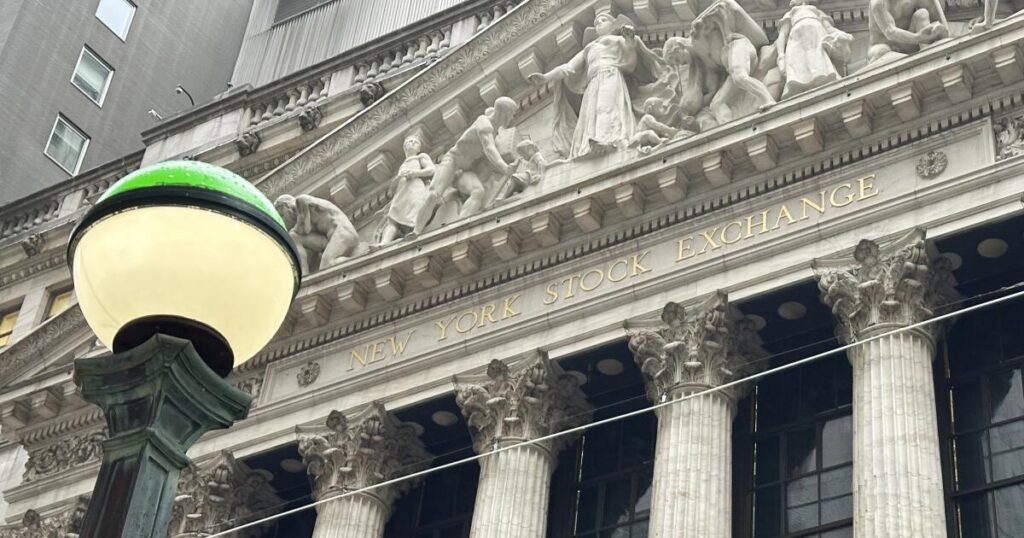US stocks fell on Monday after rising yields in the bond market due to the strength of the US economy increased pressure on Wall Street.
The S&P 500 fell 1.2%, after last week's loss of 1.6%, which was the worst since October. The Dow Jones Industrial Average fell 0.7%, and the Nasdaq Composite Index fell 1.8%.
Stocks rose strongly earlier in the day, with oil prices falling on hopes international efforts to calm rising tensions in the Middle East will help. But Treasury yields also rose after the latest report on the US economy, beating expectations.
The economy and financial markets are at a critical juncture as this strength raises hopes for increased corporate profits but also hurts prospects for interest rate easing by the Federal Reserve. They are the two main levers that determine stock prices, and at the same time they are pulling Wall Street in different directions.
Traders want lower interest rates, which could give a boost to the economy overall, and much of the US stock market's recent rise to record levels has been based on expectations of cuts.
But strong reports like Monday's, which showed that US shoppers increased their spending at retailers last month by more than expected, have traders widely anticipating only one or two interest rate cuts this year, according to data from CME Group. This is lower than expectations of six or more cuts at the beginning of this year. Some traders are bracing for the absence of potential cuts because inflation and the overall economy have remained above expectations this year.
Rising interest rates and bond yields hurt the prices of all types of investments, especially those that appear expensive or those that compete for the same type of investors as bonds.
As a result, REITs fell to some of the biggest losses Monday on the stock market. When bonds pay higher yields, they drive away investors who might otherwise be interested in the relatively large dividends that real estate stocks pay. Higher rates can also put pressure on property prices across the board.
For example, Boston Properties, which owns the office, fell 3.2%.
Even more impactful was the weakness in big technology stocks. Apple shares fell 2.2%, NVIDIA shares fell 2.5%, and Microsoft shares fell 2%. They have previously benefited from low interest rates and often feel pressure when yields rise. Because it is also the largest stock on Wall Street, its movements carry extra weight over the S&P 500 and other indexes.
Microsoft, for example, went from an early gain of 1.2% to a loss in the afternoon and was the second biggest force impacting the S&P 500.
What helped control losses were some financial companies that announced encouraging profits at the beginning of the year. Pressure is broadly on companies to make greater profits as interest rates look less likely to provide support in the near term.
Goldman Sachs shares rose 2.9% after its report.
M&T Bank shares rose 4.7% after it announced first-quarter profits that slightly exceeded analysts’ expectations. She also said she underestimated the amount of pain that would occur if the stressed commercial real estate industry declined sharply.
Charles Schwab stock rose 1.7% after also beating analysts' expectations for its fourth-quarter earnings.
In total, the S&P 500 index fell 61.59 points to 5,061.82. The Dow Jones index fell 248.13 points to 37,735.11 points, and the Nasdaq Composite index fell 290.08 points to 15,885.02 points.
In the oil market, a barrel of US crude for May delivery fell 25 cents to $85.41, as political leaders urged Israel not to retaliate after the Iranian attack on Saturday that used hundreds of drones, ballistic missiles and cruise missiles. Brent crude, the international standard, fell 35 cents to $90.10 a barrel.
Financial markets were tense ahead of the weekend. The concern was that an attack by Iran could expand Israel's war with Hamas and ultimately limit the flow of crude oil. But Israel said 99% of the drones and missiles had been intercepted, while diplomats urged de-escalation and the US administration made clear it did not support a broader war with Iran.
The jump in oil prices this year has raised concerns about its indirect impact on inflation, which has remained stubbornly high. After slowing sharply last year, inflation has been consistently above expectations every month so far in 2024.
“If inflation remains steady due to momentum in the economy, that is not necessarily bad for stocks,” Bank of America strategists led by Osung Kwon wrote in a Bank of America global research report. “But so is stagflation,” he said, referring to the painful combination of a stagnant economy and high inflation.
Strategists at the Wells Fargo Investment Institute raised their forecasts for where the S&P 500 could end up this year in part because of the surprising strength of the U.S. economy. While they expect stock prices to be volatile after big gains since October, they say the growing US economy should drive corporate sales.
In the bond market, the yield on the 10-year Treasury note rose to 4.61% from 4.52% late Friday.
Choi writes for the Associated Press. AP writers Matt Ott and Zimo Zhong contributed.
